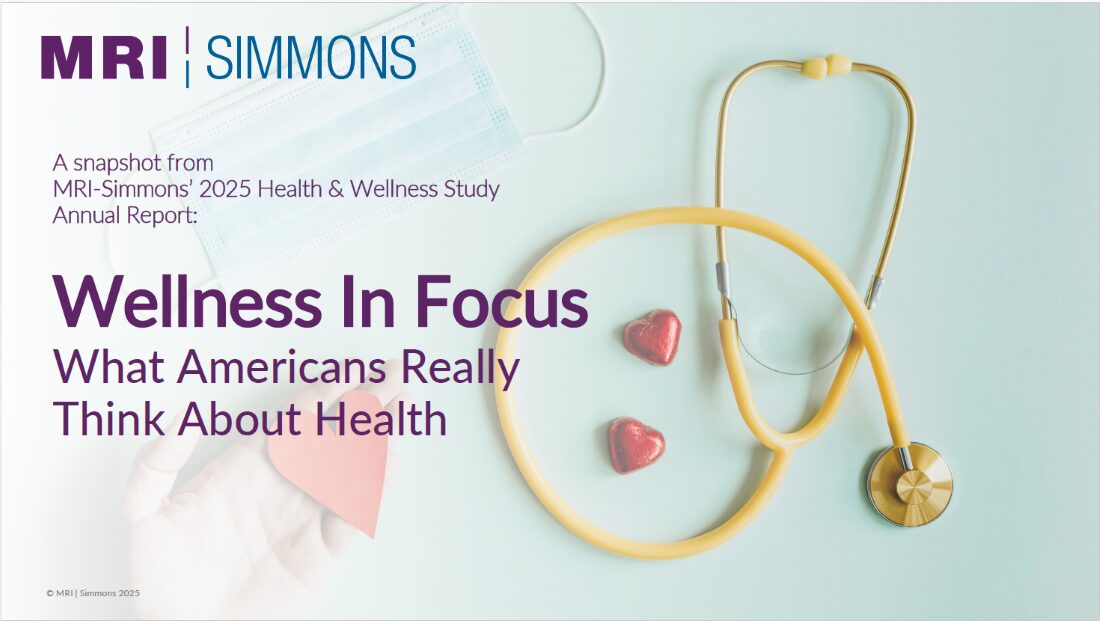Unpacking U.S. Vaccine Attitudes This Flu Season
As flu season ramps up across the U.S., health officials are urging Americans to take preventative measures. According to MRI-Simmons’ Health & Wellness Study, there is a gap between vaccine belief and behavior. This complex landscape of attitudes, access, and trust is one that marketers and media professionals should understand deeply to connect with audiences in meaningful ways.
Vaccines Seemingly Work, But Behavior Doesn’t Always Follow Belief
Americans overwhelmingly believe in the power of vaccines. 82% agree that vaccines have had a positive impact on controlling serious disease, and 66% say they get vaccinated because their healthcare provider recommends it. These numbers show that trust in medicine remains a strong motivator for this preventative care.
However, when it comes to actual behavior, the numbers tell a different story. 67% of US adults think it's important to get vaccinated for the flu annually, despite only 38% reporting they’ve gotten the flu vaccine in the past year. Additionally, the initial urgency of the COVID vaccine has waned. 66% of U.S. adults have received the COVID vaccine at some point, but only 52% plan to follow CDC guidelines for future shots. This drop-off and disconnect between attitude and behavior suggest that ongoing messaging may need to shift toward long-term health benefits and community protection.
Interestingly, 49% of Americans are worried about other viruses like monkeypox and bird flu becoming pandemics, indicating a lingering concern about emerging threats. We see that this concern doesn’t always translate into proactive health behavior, highlighting a key opportunity for public health campaigns to bridge the gap between awareness and action.
Where Americans Choose to Get Vaccinated
When Americans do get vaccinated, 64% typically go to their doctor’s office, reinforcing the importance of traditional healthcare settings. But retail health clinics are gaining traction: 89% of U.S. adults are familiar with them, and 30% have used one in the past year. 19% have specifically used a retail clinic for preventative care, such as receiving a vaccine.
Among retail clinic users, the top destinations are CVS (36%), Walgreens (19%), and Walmart (16%). These brands have become trusted hubs for quick, accessible care especially for busy consumers who may not have time for a doctor’s appointment. For marketers, this trend opens doors for partnerships, in-store promotions, and localized messaging that meets consumers where they are.
Still, the majority of Americans prefer the familiarity of their doctor’s office, suggesting that while convenience matters, trust and continuity of care remain central to vaccine decisions.
Vaccine Skeptics: A Distinct and Influential Subgroup
Not everyone is on board with vaccines. 27% of U.S. adults say they don’t believe in vaccines, and their behaviors diverge sharply from the general population. These individuals are nearly 30% less likely to have seen a healthcare provider in the past six months (42% vs. 59%), and 59% only go to the doctor when they’re really sick.
Their skepticism runs deep: 80% believe vaccines are only about profits, 52% prefer alternative medicine, and 49% trust homeopathic remedies. Nearly half (46%) even lean on their friends for their health care advice. These attitudes reflect a broader distrust in institutional healthcare and a preference for peer-driven or holistic approaches.
For media planners and brand marketers, this group presents both a challenge and an opportunity. Messaging that emphasizes transparency, community voices, and holistic wellness may resonate more than traditional medical appeals. Understanding their values is key to crafting campaigns that don’t alienate but instead invite dialogue.
Even among those who support vaccines, skepticism about pharmaceutical companies persists. 40% of U.S. adults in general believe vaccines are mostly about profiting the companies that make them. This sentiment is consistent across gender but spikes for Millennials (52%) and Hispanic Americans (50%), underscoring a growing demand for transparency in healthcare marketing in certain markets.
This perception may be fueling hesitancy, especially when combined with misinformation and politicization. For brands and media companies, addressing these concerns head-on through educational content, expert voices, and community engagement can help rebuild trust and drive informed decision-making.
Staying Healthy This Flu Season
As flu season intensifies, Americans are navigating a complex web of beliefs, behaviors, and barriers around vaccines. While most agree vaccines are important and effective, actual uptake remains inconsistent. Trust in healthcare providers is strong, but skepticism about pharmaceutical motives and alternative medicine preferences are shaping consumer choices. For media planners, advertisers, and health brands, the key is to meet consumers where they are. Whether that’s in a doctor’s office, a retail clinic, or online communities, tailored messaging that acknowledges concerns, highlights convenience, and reinforces the value of prevention can make a real impact.
This season, staying healthy isn’t just about getting a shot. It’s about understanding the mindset behind the decision. And that’s where data-driven insights can make all the difference.
Sources: 2025 Health & Wellness Study (SP25 USA). Base: Total adults 18+.
Activating Health & Wellness Targets through MRI-Simmons
Through MRI-Simmons' activation solution, ACT, marketers can leverage trusted and nationally representative data to target and reach U.S. adults who support getting the flu vaccine, go to retail health clinics, have differing opinions on vaccine effectiveness, or any other target in this blog. Curate your audience with over 60,000 consumer elements: 1000+ attitudes and opinions, 6500+ brands in 1000+ product categories; and 90+ proprietary segments. Then, activate your audience via the ad-tech platform or media partner of your choice.





